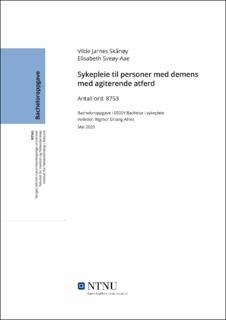| dc.contributor.advisor | Alnes, Rigmor Einang | |
| dc.contributor.author | Skånøy, Vilde Jarnes | |
| dc.contributor.author | Sveøy-Aae, Elisabeth | |
| dc.date.accessioned | 2020-08-10T16:00:35Z | |
| dc.date.available | 2020-08-10T16:00:35Z | |
| dc.date.issued | 2020 | |
| dc.identifier.uri | https://hdl.handle.net/11250/2671384 | |
| dc.description.abstract | Bakgrunn: Agitasjon forekommer ofte hos personer med demens. Dette kan påvirke
pasientens tilværelse i negativ forstand. Det kan være svært belastende både for den
det gjelder, men også for alle andre rundt. Det finnes ingen kur mot demens, men det
er mye sykepleiere kan gjøre for at personer med demens skal leve verdige liv.
Hensikt: Formålet har vært å undersøke hvilke intervensjoner sykepleiere kan foreta
for å forebygge og redusere agitasjon hos personer med demens på sykehjem. Mye
tyder på at den utstrakte bruken av farmakologisk behandling ikke står i forhold til
dokumentert effekt. Oppgaven belyser dermed andre sykepleieintervensjoner som kan
iverksettes for å både forebygge og håndtere agitasjon.
Metode: Dette er en systematisk litteraturstudie som baserer seg på
forskningsartikler, pensumlitteratur og annen relevant faglitteratur. Det er brukt åtte
ulike forskningsartikler, og funnene fra disse artiklene ble analysert tematisk og
deretter drøftet kategorisk.
Resultat: Personsentrert omsorg og kommunikasjon hadde vist best effekt. Ulike
former for stimuli, som tilgang på utearealer, spill, lesing og samhandling reduserte
forekomsten av agitasjon. Omsorgsgiverens holdninger samt evnen til planlegging
kunne påvirke pasientens atferd. Kunnskap om demens viste seg videre å være
avgjørende for håndteringen av agitasjon.
Konklusjon: Sykepleieren kan forebygge og redusere agitasjon gjennom
personsentrert omsorg, individuell tilnærming, organisatorisk kompetanse, god
kommunikasjon, samt bruk av ulike stimuli. God ledelse har betydning for at kulturen
på hvert enkelt sykehjem prioriterer personsentrert omsorg som et verdigrunnlag. | |
| dc.description.abstract | Background: Agitation is a common challenge for patients living with dementia. It
occurs quite frequently, and it can affect the lives of both the patient and the patients’
dependents. There is no effective cure for dementia, but there is a lot we can to
increase the wellbeing of people living with dementia.
Aim: We have investigated the nursing interventions that both could prevent and
reduce agitated behavior in people with dementia living in nursing homes. Studies
suggest that pharmacological interventions do not have the desired therapeutic effects
to the degree that warrant their widespread use. This literature study sheds light on
the effectiveness of other nursing interventions that can be implemented in the daily
care for people living with dementia to both prevent and reduce agitated behavior.
Method: This is a systematic review that is based on research articles as well as
relevant academic literature. Eight different research articles have been used, and the
results from these articles were thematically analyzed and then further discussed by
category.
Result: Person-centered care and communication had shown the best results in
reducing agitation. Different forms of stimuli, such as access to outdoor areas, playing
games, reading and interaction, reduced the incidence of agitation. The caregiver's
attitudes, as well as the ability to organize the facility, could influence the patients'
behavior. Knowledge about the disease was furthermore crucial to the management of
agitation.
Conclusion: Person-centered care, an individual approach, organizational matters,
good communication and use of various stimuli, can prevent and reduce agitation.
Good leadership is important to nurture a culture that prioritizes person-centered care
in nursing homes. | |
| dc.publisher | NTNU | |
| dc.title | Sykepleie til personer med demens med agiterende atferd | |
| dc.type | Bachelor thesis | |
